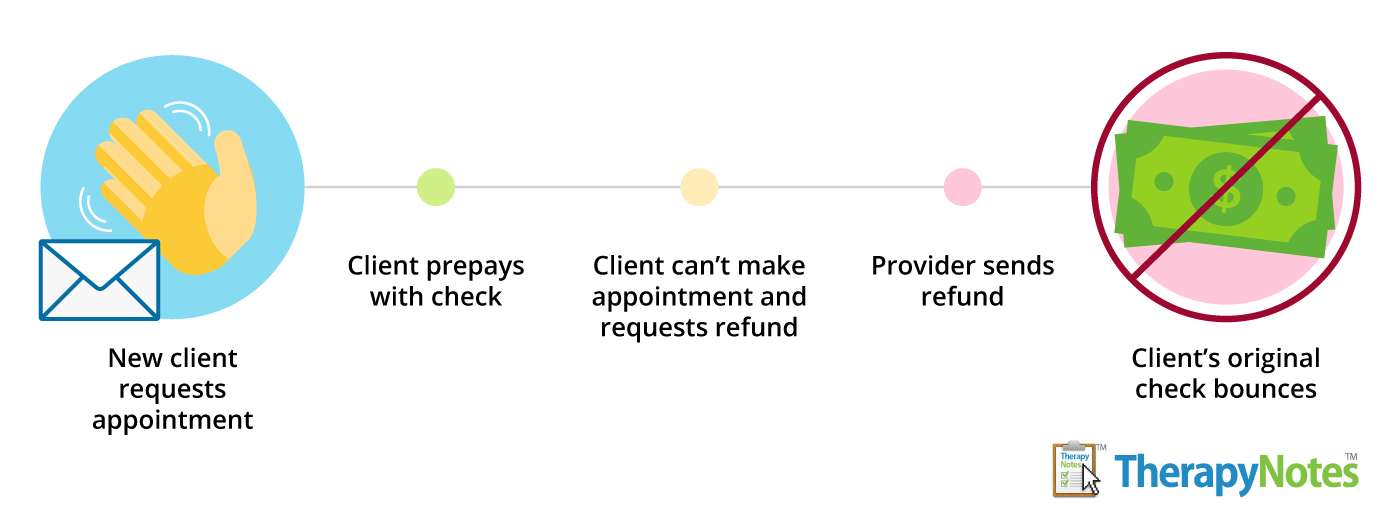Watch Out for This Scam Targeting Therapists and Counselors
By TherapyNotes, LLC on April 4, 2018

A simple email requesting an appointment generally won't raise any red flags for providers, but scammers have taken advantage of this to steal from the therapy community. While this scam started many years ago, it resurfaces every so often and can cost providers hundreds of dollars.
Though the details vary, the approach is the same: a potential client will be in town for a short period of time and would like to schedule a session with you. Sometimes, it may be a couple seeking marriage counseling on their vacation. Other times, it could be a father seeking treatment for his wife and daughters while they visit family. These email requests may be flattering; the potential client tells you how they found your wonderful website that you spent so much time creating or how they were referred by friends or other professionals who fawned over your clinical skill. Nevertheless, be wary. These requests and compliments are likely not as genuine as they appear.
Here's an example of the scam:
Thank you for the email. I am seeking individual services for my daughter. I got your name while searching through your location for a therapist, my daughter is coming to your area, she will stay for 4 weeks and i will want her to get something doing when she arrives in the area. I'll like to know if you can help in counseling her one-on-one sessions. Her name is Katrina, she is 19 years old, i have someone that will always picks her up from home stay and drops her off for her counseling and take her back to the home stay. So kindly let me know your charges cost per hour in order for me to arrange for her payment before she travels down to your area soon, i did not have insurance that cover the cost. She will be staying for 4 weeks, she will be available at any times/days schedules for the counseling starting from June 13th, 2017. You can take her on any day convenient for you for 60 minutes counseling a day, 2 time per week for 4 weeks. You can just take her at your convenient schedule. I hope to read back from you soon.
Thank you,
Laura
How is this a scam?
The trick begins when you agree to book time for these potential clients. The scammer usually asks to send a check to prepay for your services. Then, shortly after you receive the check, the scammer sends you another message; for one reason or another, they want a partial refund. They may explain that the check was made out for too much, or perhaps their time in town has been cut short unexpectedly. Being ever-so-generous, the scammer may only ask that you send part of the fee back, offering to let you keep some additional money as a way to compensate you for your time and frustration.
Here's the issue: the original check will always bounce. Not only are you out the original fee (no big deal—you never actually rendered services), but you also lose whatever amount you "refunded" plus bank fees for the bounced check. The scammer quickly runs off with your "refund" often before you even have a chance to cancel the check.

How do I protect myself?
Always look at initial requests for services with a critical eye. When was the last time you wanted to go to counseling with an entirely new provider while on vacation? Is your office even in a reasonable vacation destination? Prepaying for services is certainly not unheard of, but if you receive a check for an unreasonable amount, pause before trying to deposit it. Then, if the client informs you that they sent the incorrect amount, offer instead to shred the check and ask for a new one for the correct amount. At this point, a refusal and a request for refund ought to be a huge red flag. Always wait for a check to clear before issuing any sort of refund. You may still lose out on bank fees for the bounced check but not the hundreds of dollars lost on the refund.
If you believe you encountered a scammer, you can also report these scams to the FBI Internet Crime Complaint Center.
* The content of this post is intended to serve as general advice and information. It is not to be taken as legal advice and may not account for all rules and regulations in every jurisdiction. For legal advice, please contact an attorney.
Get more content like this, delivered right to your inbox. Subscribe to our newsletter.
More Content You'll Enjoy
The Best Practice Fusion Alternative for Mental Health

Supercharge your Documentation with TherapyFuel!

